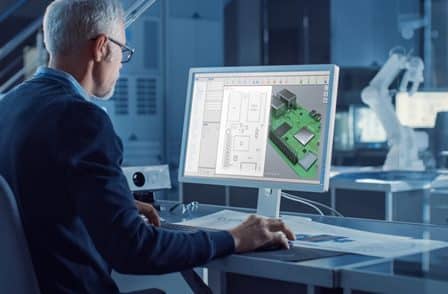Course Overview
The Master of Engineering (Civil: Railway Infrastructure) will equip you with the necessary skills to address the demands of the railway engineering industry. You will receive high-level professional and technical development for engineers working with track and the infrastructure in the rail corridor. Upon completion of this program, you will gain skills and knowledge in the latest and developing technologies in railway infrastructure.
What makes this degree so unique and valuable?
It covers excellent Railway Engineering topics, such as: Ballast Sleepers and Fasteners, Railway Projects and System Engineering, Rail and Related Track Structures, Track Structure and Formation Design, Track Geometry and Train Interaction.
The program provides great opportunities to learn industry software:
- the iFBSsoftware, FBS Timetable construction, developed by the research institutes
- RailLab, a unique solution for railway track/geology and operation calculation
- Practical railway operation simulation.
- Digital Engineering and related standards in asset management.
Students will learn to design and manage the construction of a railway crossing above civil structures and will have an opportunity to publish research in collaboration with industry practice professors.
Students from various backgrounds can join this course, including engineers (civil and construction, transport, urban), railway design and maintenance, rail technicians, operation simulation experts, operation coordinators, skilled civil and rail laborers, rail supervisors, track maintainers, light rail technicians, and track workers.
Program Details
The billions of dollars’ worth of public and private resources invested in rail track infrastructure around the world demand a well-trained and competent engineering workforce for the safe and efficient operation of the track and associated assets. However, developments over the past twenty years, such as downsizing of public railway authorities, increased retirement of experienced employees, privatization, and the rapid expansion of the rail industry have left engineers with severely limited pathways to upskill themselves quickly.
This degree has been developed by railway experts to address the specific needs of the industry. The industry focus of the degree is enhanced through the expectation that students will be employed in the railway industry during all or part of their studies. The units in this master’s degree were structured with this very purpose in mind.
This optimal mix of academic and industry-based learning provides engineers with more advanced skills and knowledge much faster than workplace training can do.
Through EIT’s online delivery, railway engineers can study the degree from anywhere in the world. The blend of differing railway contexts, operating standards, practices, and policies experienced by these engineers living in many countries will provide a unique learning opportunity for them as they interact with each other throughout the degree.
Despite the very diverse locations of railway infrastructure engineers, the course coordinators and lecturers work hard to build a sense of professional community among the students.
The program is delivered using a wide range of learning activities such as live webinars, written assignments, case studies, team projects, remote laboratories, and more. These experiences aim to get the students interacting via technology-based learning experiences that highlight shared skills and knowledge derived from the many cultural and technical contexts in which the students are working.
You must complete 48 credit points comprising twelve core units and one capstone thesis. There are no electives in this program. The program duration is two years, and we deliver units over four terms per year, so you will take two units per term. There will be a short break between years.
Year One
| Term | Unit Code | Subjects | Credit Points |
| Term 1 | MRI501 | Introduction to Railway Operations | 3 |
| Term 1 | MRI502 | Introduction to Railways Management | 3 |
| Term 2 | MRI503 | Sustainable Engineering Principles | 3 |
| Term 2 | MRI504 | Ballast Sleepers and Fasteners | 3 |
| Term 3 | MRI505 | Railway Projects and Systems Engineering | 3 |
| Term 3 | MRI506 | Rail and Related Track Structures | 3 |
| Term 4 | MRI507 | Management of Railway Assets | 3 |
| Term 4 | MXX501/601 | Engineering Research and Practice | 3 |
Year Two
| Term | Unit Code | Subjects | Credit Points |
| Term 1 | MRI601 | Track Structure and Formation Design | 3 |
| Term 1 | MRI602 | Track Geometry and Train Interaction | 3 |
| Term 2 | MRI603 | Construction and Capital Works | 3 |
| Term 2 | MRI604 | Environment Safety and Standards | 3 |
| Terms 3 & 4 | ME700 | Project Thesis (taken over 2 terms – equivalent to 4 units) | 12 |
Additional Mandatory Units
| Semester | Unit Code | Subjects | Credit Points |
| N/A | BXX001* | Hands-on Workshop 1 | 0 |
| N/A | BXX002* | Hands-on Workshop 2 | 0 |
| N/A | BXX003* | Hands-on Workshop 3 | 0 |
| N/A | BXX004* | Hands-on Workshop 4 | 0 |
| N/A | MXX001 | Professional Practice Hands-on Workshop | 0 |
| N/A | MXX510 | Professional Experience | 0 |
*Applicable to students gaining entry under option 1) or 4) of the Entry Requirements.
Graduate Diploma of Engineering (Civil: Railway Infrastructure)
Students who elect to exit the program after successfully completing all of the first-year units, as outlined above, can opt to receive EIT’s Graduate Diploma of Engineering (Civil: Railway Infrastructure). If students wish to finalize the Master qualification after exiting at Graduate Diploma level, they will need to re-enroll and relinquish the Graduate Diploma testamur.
Rules of Progression
You can only attempt the Project Thesis once you have successfully completed all other units. All engineering disciplines are built up of individual bodies-of-knowledge that together target a specific application. It not only relies on the combined body of knowledge from the undergraduate degree, specifically mathematics, physics, and discipline knowledge, but also on the various units that form this program.
The ‘500’ level units are designed at the Australian Qualifications Framework level eight (Graduate Diploma). The knowledge from each unit allows you to be able to investigate challenging problems, analyse and synthesize complex solutions, and communicate your solutions and ideas.
This will enable successful progress to the ‘600’ level units at the Australian Qualifications Framework level nine (master’s degree). All this knowledge is brought together as you tackle complex application problems in your final thesis.
The content of each unit is designed to provide a graduated increase in knowledge and skills from the ‘500’ level units to the ‘600’ level units culminating in a Project Thesis. All units must be passed, or have exemptions, to achieve the qualification.
The Graduate Diploma of Engineering is nested within the master’s degree as an exit point only after the successful completion of all the ‘500’ level units of the program. Both qualifications have the same entry requirements. The second year of the master’s degree does not serve as an entry point.
Work-Integrated Learning
EIT’s Master of Engineering programs require students to undertake 240 hours of paid or unpaid professional work-integrated learning. This can incorporate paid or unpaid internships, site visits, contributing to industry projects, and networking activities.
In undertaking an internship, students will interact with employees and become exposed to organizational policy and culture. You will familiarise yourself with organizational communication procedures, a variety of engineering disciplines, and obtain insight and practical aptitude in projects from the planning phase to completion.
If you already have some work experience in the relevant engineering field, you may apply to have credit granted by completing the associated recognition of prior learning form.
To gain entry into this program, we require applicants to hold:
- A recognized 3-year bachelor degree* in an engineering qualification in a congruent** field of practice; OR
- An EIT Bachelor of Science (Engineering) degree* in a congruent** field of practice; OR
- A 4-year Bachelor of Engineering qualification (or equivalent) that is recognized under the Washington Accord or by Engineers Australia, in a congruent**, or a different field of practice at the discretion of the Admissions Committee; OR
- A 4-year Bachelor of Engineering qualification (or equivalent)* that is not recognized under the Washington Accord, in a congruent** field of practice to this program; AND
- An appropriate level of English Language Proficiency equivalent to an English pass level in an Australian Senior Certificate of Education, or an IELTS score of 6.0 (with no individual band less than 6.0), or equivalent as outlined in the EIT Admissions Policy.
* With integrated compulsory twelve-week professional industry experience, training or project work of which six weeks are directly supervised by a professional/eligible professional engineer as determined by EIT.
** Congruent field of practice means one of the following with adequate Railway Infrastructure content (fields not listed below to be considered by the Dean and the Admissions Committee on a case-by-case basis):
- Civil Engineering
- Construction Engineering
- Transport Engineering
- Urban Engineering
- Mechanical Engineering
- Railway Infrastructure
- Railway Design and maintenance
- Railway Maintenance
- Railway Systems
- Material and Mechanical Systems
- Project Engineering
Please note: meeting the minimum admission criteria does not guarantee entry to our programs. Applications are assessed on a case-by-case basis.
Please check the Documentation Guidelines for your application.
For full current fees in your country go to the drop down filter at the top of this page or visit the Fees page.
Payment Methods
Learn more about payment methods, including payment terms & conditions and additional non-tuition fees.
Like all Australian higher education providers and universities, EIT programs are accredited by the exacting standards of the Australian Government’s Tertiary Education Quality and Standards Agency (TEQSA).
Find out more about country-specific accreditation and professional recognition.
This course is classified as Level 9 under the Australian Qualifications Framework (AQF).
Potential job roles include engineering and management positions in the following areas of expertise:
- Project Engineer
- Asset Manager
- Project Manager
- Perway Engineer
- Senior Civil Engineer
- Rail Project Engineer
- Senior Track Designer
- Track Engineer
- Safety assurance engineer
- Chief estimator
Our master’s degrees take 2 years to complete. We deliver our online master’s degrees on a part-time intensive basis. After enrolment the maximum time allowed to complete all units is 5 years. Part-time students are expected to spend approximately 20 hours per week learning the program material and completing assessments. This includes attending tutorials.
Any student has a right to appeal a decision of the Engineering Institute of Technology (EIT) or any member of the institute’s staff. EIT has a comprehensive Policy on Appeals and Grievances to assist students.










